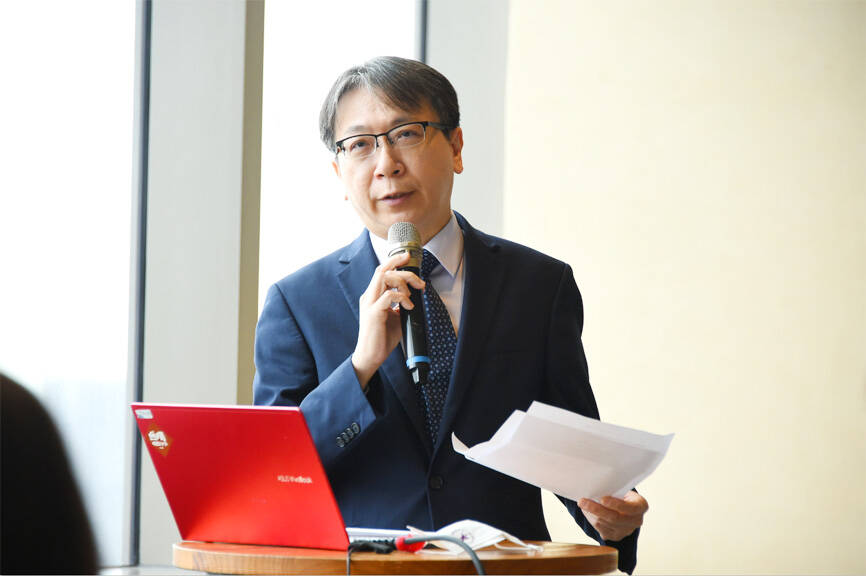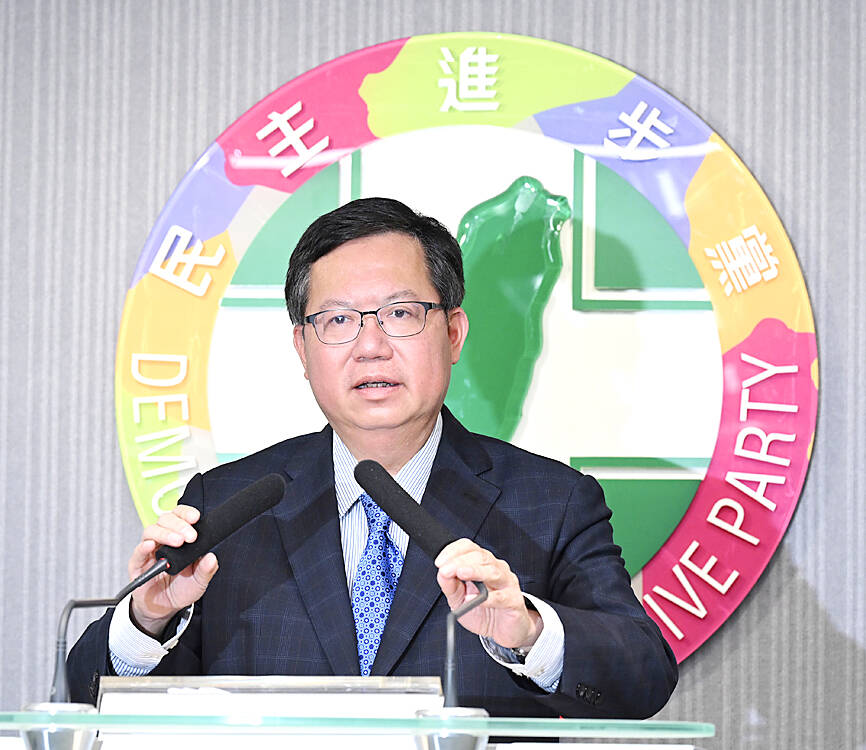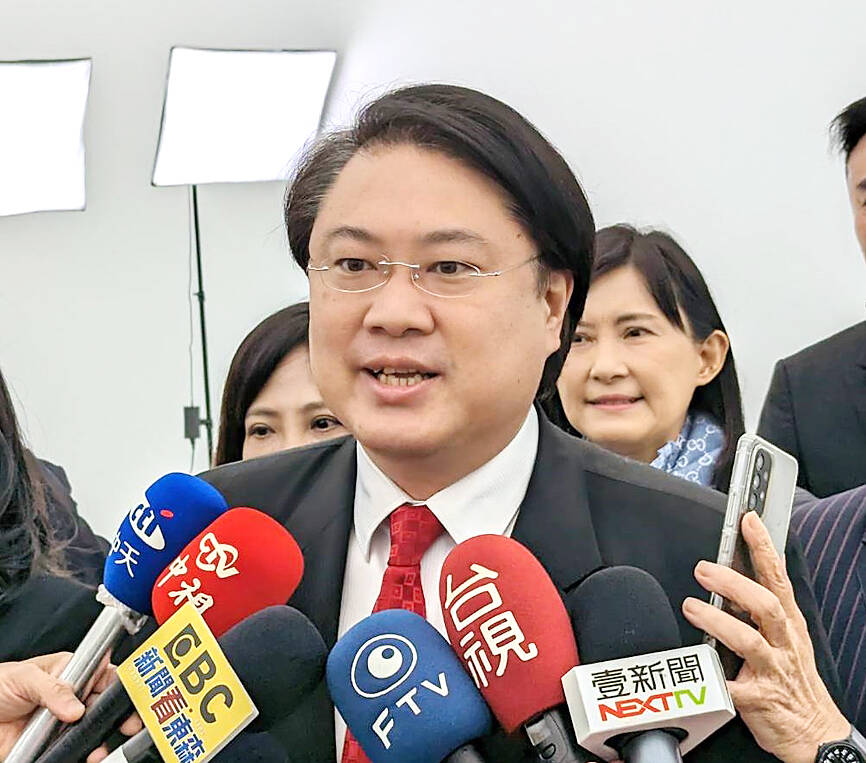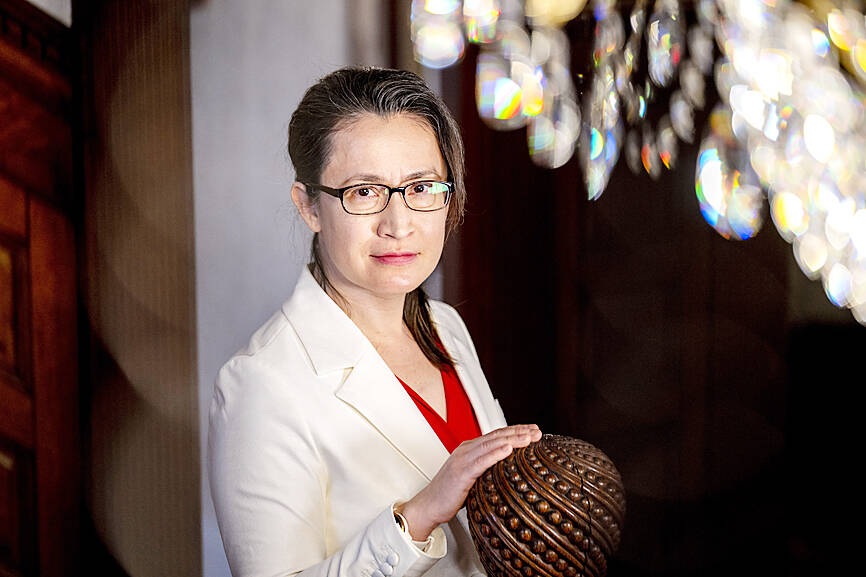President Tsai Ing-wen (蔡英文) yesterday appointed Deputy Minister of Foreign Affairs Tsai Ming-yen (蔡明彥) as new National Security Bureau director-general and Lin Chia-lung (林佳龍) as Presidential Office secretary-general, ahead of a Cabinet reshuffle.
Former Taoyuan mayor Cheng Wen-tsan (鄭文燦) is to become vice premier, while former Keelung mayor Lin Yu-chang (林右昌) is to become minister of the interior, the Chinese-language Liberty Times (the Taipei Times’ sister newspaper) reported, citing a preliminary list of Cabinet positions compiled by the Presidential Office on Wednesday, after Premier Su Tseng-chang (蘇貞昌) announced the resignation of his Cabinet before the Lunar New Year holiday.
The report came a day after the government confirmed that former vice president Chen Chien-jen (陳建仁) was nominated by Tsai Ing-wen to be the new premier.

Photo: Tu Chien-jung, Liberty Times
The new Cabinet would include more female ministers than the previous one, the Liberty Times reported.
The government has set three major principles on how Cabinet members would be selected after the president held meetings with Chen, Su and Vice President William Lai (賴清德) on Wednesday, the report said.
Deputy Minister of the Interior Chen Tsung-yen (陳宗彥), who served as deputy head of the Central Epidemic Command Center, is to become the new Executive Yuan spokesman, it said.

Photo: Lo Pei-te, Taipei Times
Executive Yuan Secretary-General Lee Meng-yen (李孟諺) and Minister of Transportation and Communications Wang Kwo-tsai (王國材) are to keep their posts, the report said.
Chen Chien-jen reportedly told Tsai Ing-wen that apart from their respective expertise, he would be selecting his Cabinet members based on three guiding principles: raising the number of female Cabinet members, retaining more officials aged 44 to 64, as well as members with experience in local governments.
Cheng was chosen because he is familiar with local politics and has a track record of successfully coordinating between central and local governments, the report said, adding that his expertise would complement Chen Chien-jen’s lack of experience in local politics.

Photo: Lu Hsien-hsiu, Taipei Times
The Presidential Office is to make a formal announcement on the new Cabinet today.
The current Cabinet is to resign on Monday, while the new members are to take office on Tuesday, it said.
Separately, local media yesterday reported that Representative to the US Hsiao Bi-khim (蕭美琴) and Minister of Foreign Affairs Joseph Wu (吳釗燮) would switch posts.

Photo: AP
As of press time last night, the government had not commented on the report.
Democratic Progressive Party Legislator Rosalia Wu (吳思瑤) said Chen Chien-jen would face a “tough job full of challenges.”
“He and his Cabinet must provide leadership ahead of the upcoming presidential and legislative elections. This is a huge job, but somebody must take up the burden,” she said. “Chen Chien-jen is the man for the job, and we all have great expectations for him to lead us into the elections.”
Additional reporting by CNA and Jason Pan

The Taiwanese passport ranked 33rd in a global listing of passports by convenience this month, rising three places from last month’s ranking, but matching its position in January last year. The Henley Passport Index, an international ranking of passports by the number of designations its holder can travel to without a visa, showed that the Taiwan passport enables holders to travel to 139 countries and territories without a visa. Singapore’s passport was ranked the most powerful with visa-free access to 192 destinations out of 227, according to the index published on Tuesday by UK-based migration investment consultancy firm Henley and Partners. Japan’s and

NATIONAL SECURITY THREAT: An official said that Guan Guan’s comments had gone beyond the threshold of free speech, as she advocated for the destruction of the ROC China-born media influencer Guan Guan’s (關關) residency permit has been revoked for repeatedly posting pro-China content that threatens national security, the National Immigration Agency said yesterday. Guan Guan has said many controversial things in her videos posted to Douyin (抖音), including “the red flag will soon be painted all over Taiwan” and “Taiwan is an inseparable part of China,” while expressing hope for expedited “reunification.” The agency received multiple reports alleging that Guan Guan had advocated for armed reunification last year. After investigating, the agency last month issued a notice requiring her to appear and account for her actions. Guan Guan appeared as required,

Japan and the Philippines yesterday signed a defense pact that would allow the tax-free provision of ammunition, fuel, food and other necessities when their forces stage joint training to boost deterrence against China’s growing aggression in the region and to bolster their preparation for natural disasters. Japan has faced increasing political, trade and security tensions with China, which was angered by Japanese Prime Minister Sanae Takaichi’s remark that a Chinese attack on Taiwan would be a survival-threatening situation for Japan, triggering a military response. Japan and the Philippines have also had separate territorial conflicts with Beijing in the East and South China

A strong cold air mass is expected to arrive tonight, bringing a change in weather and a drop in temperature, the Central Weather Administration (CWA) said. The coldest time would be early on Thursday morning, with temperatures in some areas dipping as low as 8°C, it said. Daytime highs yesterday were 22°C to 24°C in northern and eastern Taiwan, and about 25°C to 28°C in the central and southern regions, it said. However, nighttime lows would dip to about 15°C to 16°C in central and northern Taiwan as well as the northeast, and 17°C to 19°C elsewhere, it said. Tropical Storm Nokaen, currently